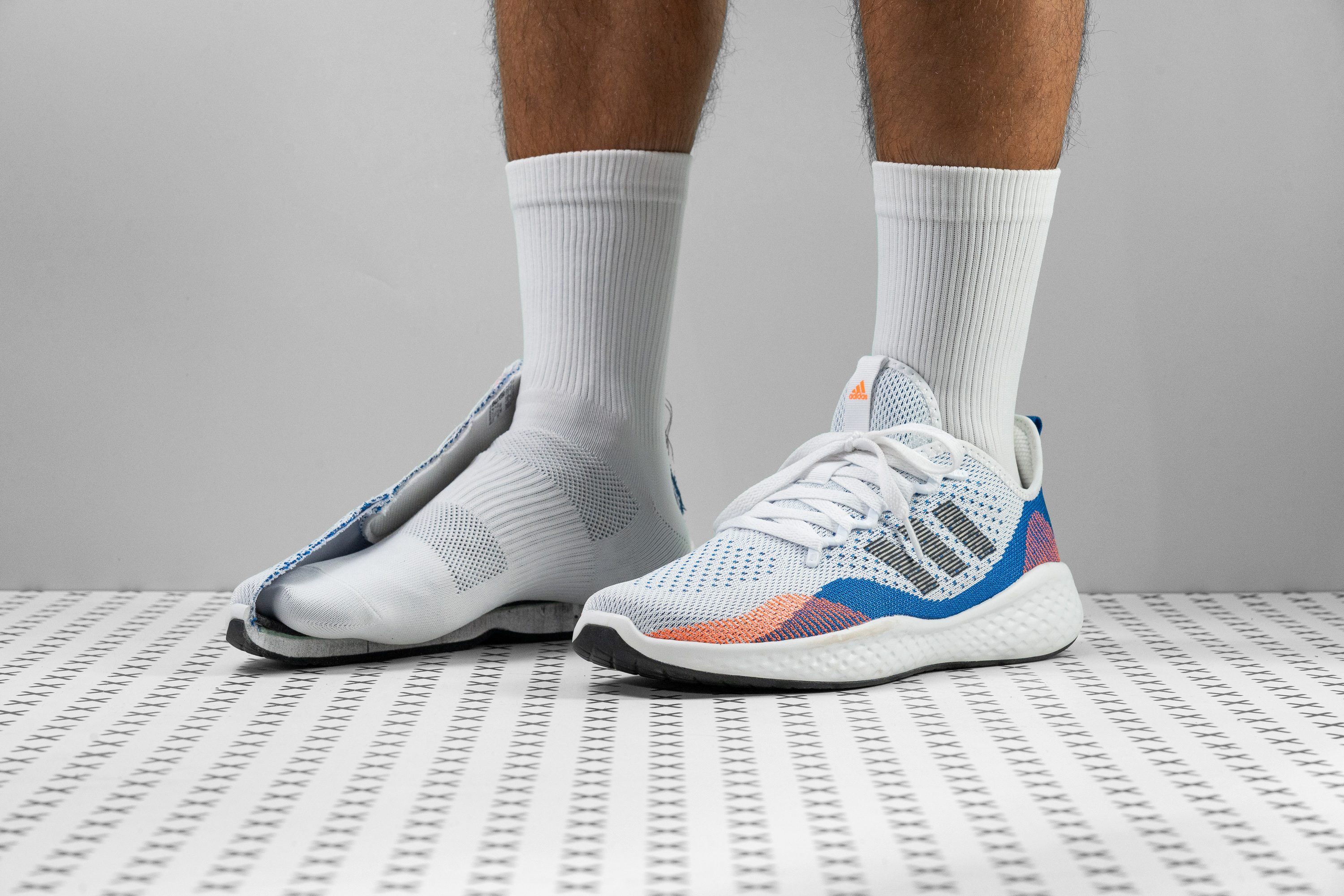Our verdict
Pros
- Bounce midsole mimics ride of more premium foams
- Extremely durable for a budget shoe
- Spacious toebox for wide feet
- Generously padded for comfort
- Suitable for running, walking, and indoor workouts
- Subtle and stylish look for casual use
- Wallet-friendly
Cons
- Could be lighter
- Limited arch support for flat feet
- Squeaky outsole
- Runs warm
Audience verdict
Comparison
The most similar running shoes compared
+ + Add a shoe | |||||
|---|---|---|---|---|---|
| Audience score | 80 Good! | 85 Good! | 74 Bad! | 75 Bad! | |
| Price | $80 | $65 | $100 | $75 | |
| Pace | Daily running | Daily running | Daily running | Daily running | |
| Shock absorption | - | Moderate | Low | Low | |
| Energy return | - | Low | Moderate | Low | |
| Traction | - | Low | Moderate | Moderate | |
| Arch support | Neutral | Neutral | Neutral | Neutral | |
| Weight lab Weight brand | 11.1 oz / 316g 11 oz / 312g | 9.7 oz / 275g 10.7 oz / 303g | 6.9 oz / 197g | 8.5 oz / 241g 8.5 oz / 240g | |
| Lightweight | ✗ | ✗ | ✓ | ✓ | |
| Drop lab Drop brand | 8.1 mm | 9.4 mm 10.0 mm | 6.9 mm | 6.0 mm 6.0 mm | |
| Strike pattern | HeelMid/forefoot | HeelMid/forefoot | Mid/forefoot | Mid/forefoot | |
| Size | Slightly large | True to size | True to size | True to size | |
| Midsole softness | Balanced | Balanced | Balanced | Firm | |
| Difference in midsole softness in cold | Small | Small | Small | Small | |
| Toebox durability | Decent | Bad | Good | Decent | |
| Heel padding durability | Good | Bad | Good | Good | |
| Outsole durability | Good | Decent | Good | Bad | |
| Breathability | Moderate | Moderate | Warm | Moderate | |
| Width / fit | Medium | Wide | Wide | Medium | |
| Toebox width | Medium | Medium | Wide | Medium | |
| Stiffness | Stiff | Moderate | Flexible | Flexible | |
| Torsional rigidity | Flexible | Flexible | Flexible | Flexible | |
| Heel counter stiffness | Flexible | Moderate | Flexible | Flexible | |
| Heel lab Heel brand | 26.4 mm | 31.2 mm 33.0 mm | 25.6 mm | 25.9 mm | |
| Forefoot lab Forefoot brand | 18.3 mm | 21.8 mm 23.0 mm | 18.7 mm | 19.9 mm | |
| Widths available | Normal | NormalWide | NormalWide | NormalWideX-Wide | |
| Orthotic friendly | ✓ | ✓ | ✓ | ✓ | |
| Season | All seasons | All seasons | All seasons | All seasons | |
| Removable insole | ✓ | ✓ | ✓ | ✓ | |
| Ranking | #319 Bottom 16% | #206 Bottom 46% | #374 Bottom 2% | #358 Bottom 6% | |
| Popularity | #188 Top 50% | #113 Top 30% | #260 Bottom 32% | #62 Top 17% |
Who should buy
We recommend the Fluidflow 2.0 to:
- Beginner and casual runners looking a catch-all exercise shoe
- Runners looking for a shoe on a low budget
- Neutral pronators who don’t require additional arch support
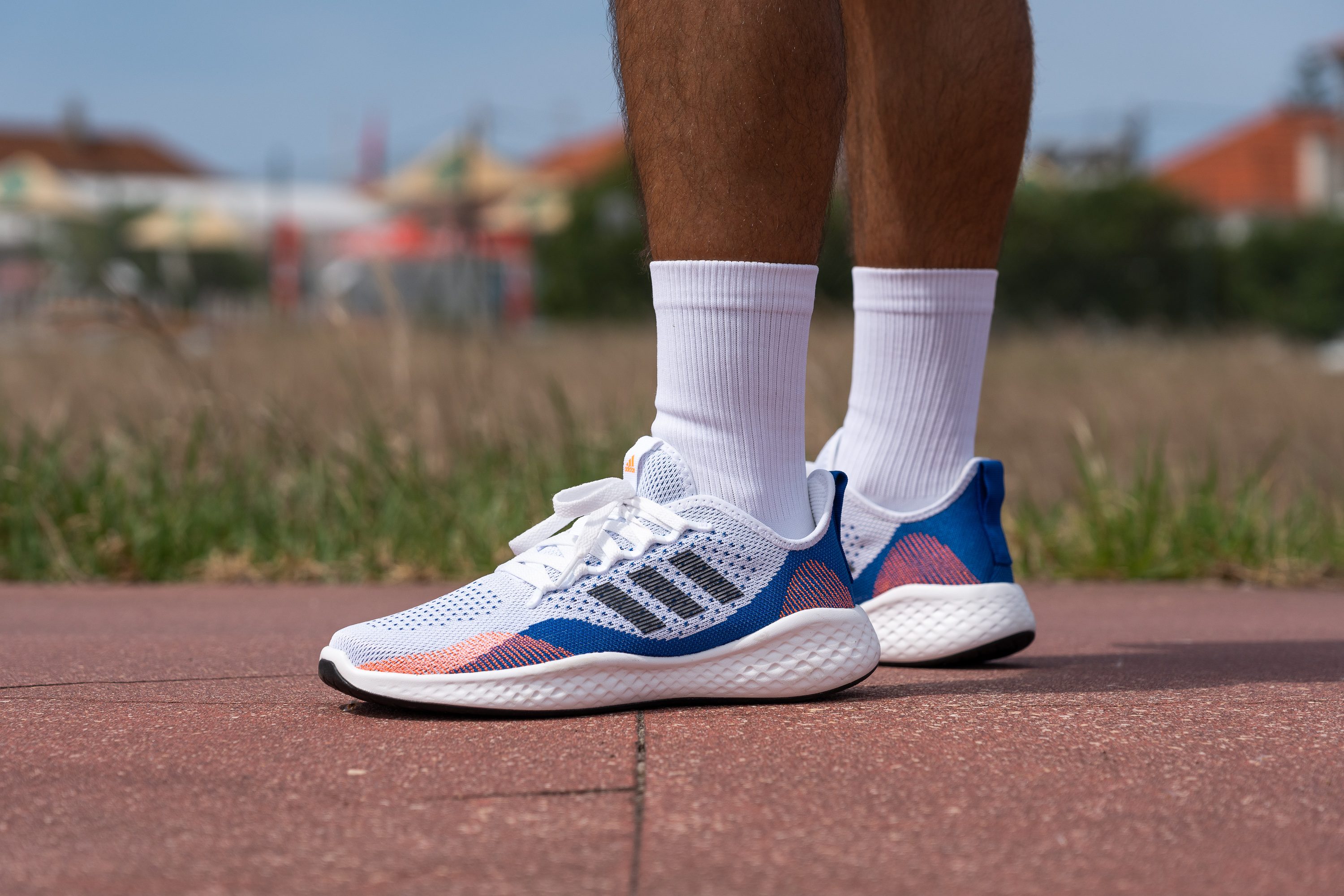
Who should NOT buy
Runners living in warm climates will be better served with a more breathable shoe. We suggest having a look at the well-ventilated Saucony Triumph 20 as an alternative.
While Fluidflow 2.0’s midsole features Adidas’ Bounce foam, its less-than-responsive ride means that we won’t be breaking any PRs in this shoe. We recommend the ASICS Novablast 3 to more serious runners looking for a speedier daily shoe that is more focused on performance.
This shoe provides almost no arch-support for flat-footed runners. For runners with flat feet we recommend the ASICS GT 1000 11 or the Brooks Launch GTS 10, both of which boast stability features that help prevent fallen arches.
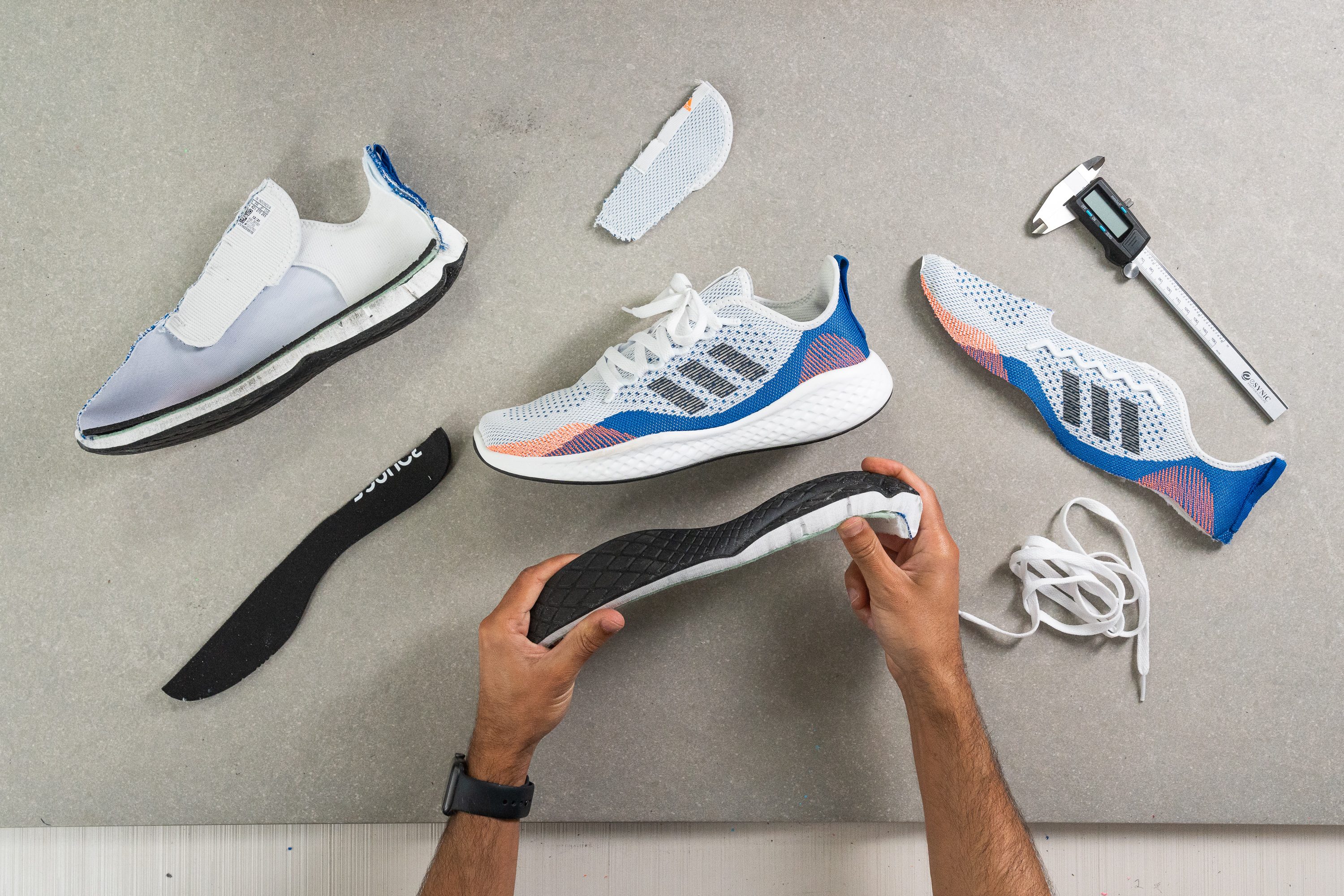
Cushioning
Heel stack
Based on our measurements, the Fluidflow 2.0 boasts a low stack of 26.4 mm at the heel. This is quite a bit shorter than our lab average, but the shoe still has enough foam underfoot to provide adequate impact protection.
Heel-strikers might prefer a shoe with more cushioning at the rearfoot, in which case we recommend the Adidas Duramo 10.
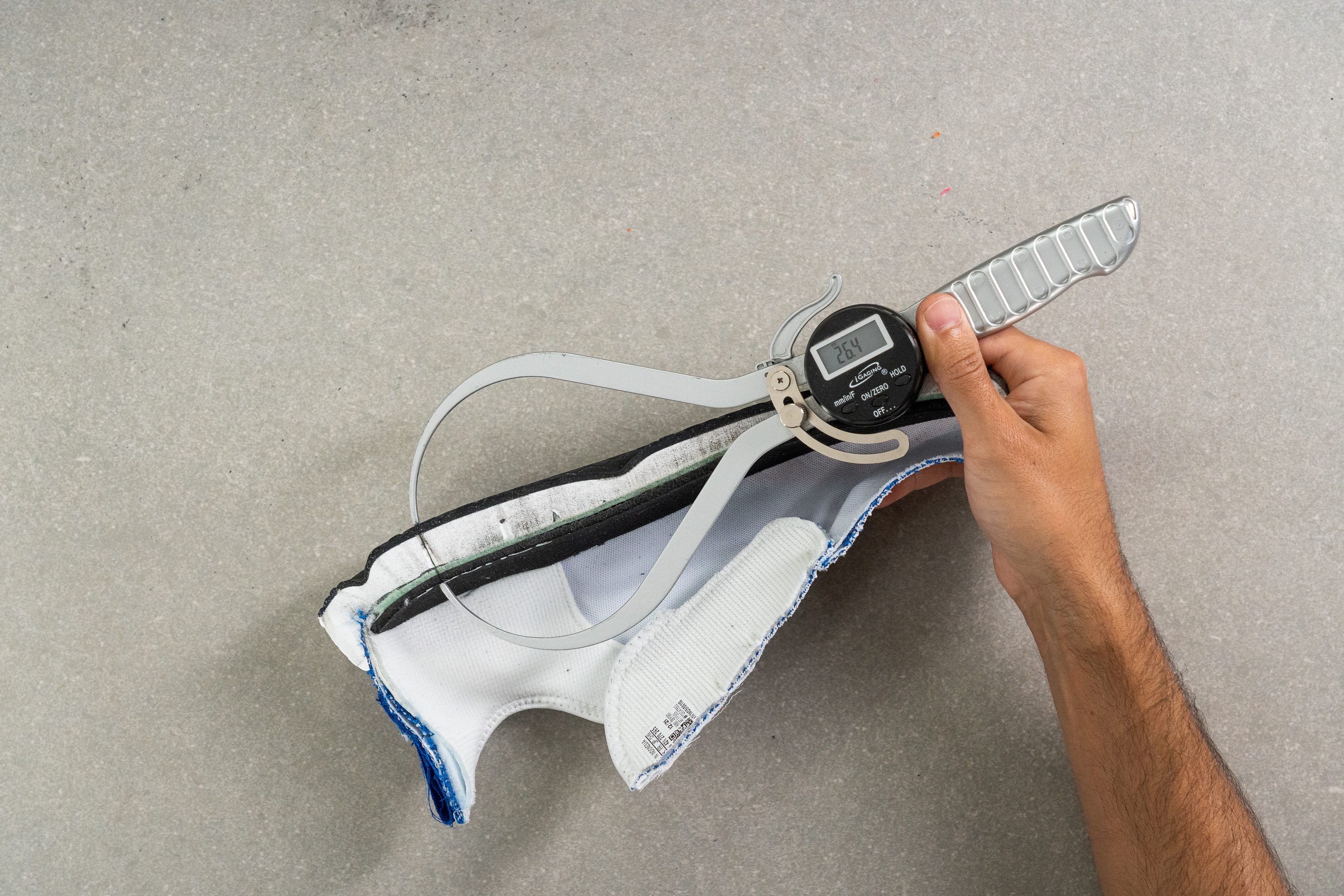
| Fluidflow 2.0 | 26.4 mm |
| Average | 34.8 mm |
Forefoot stack
The short motif continues towards the front of the Fluidflow 2.0 which boasts a forefoot stack of only 18.4 mm according to our caliper, making it notably lower than our current lab average.
This low stack-height is ideal for runners who like a lot of ground-feel on their runs, or those who aren’t used to the lofty height of maximalist running shoes.
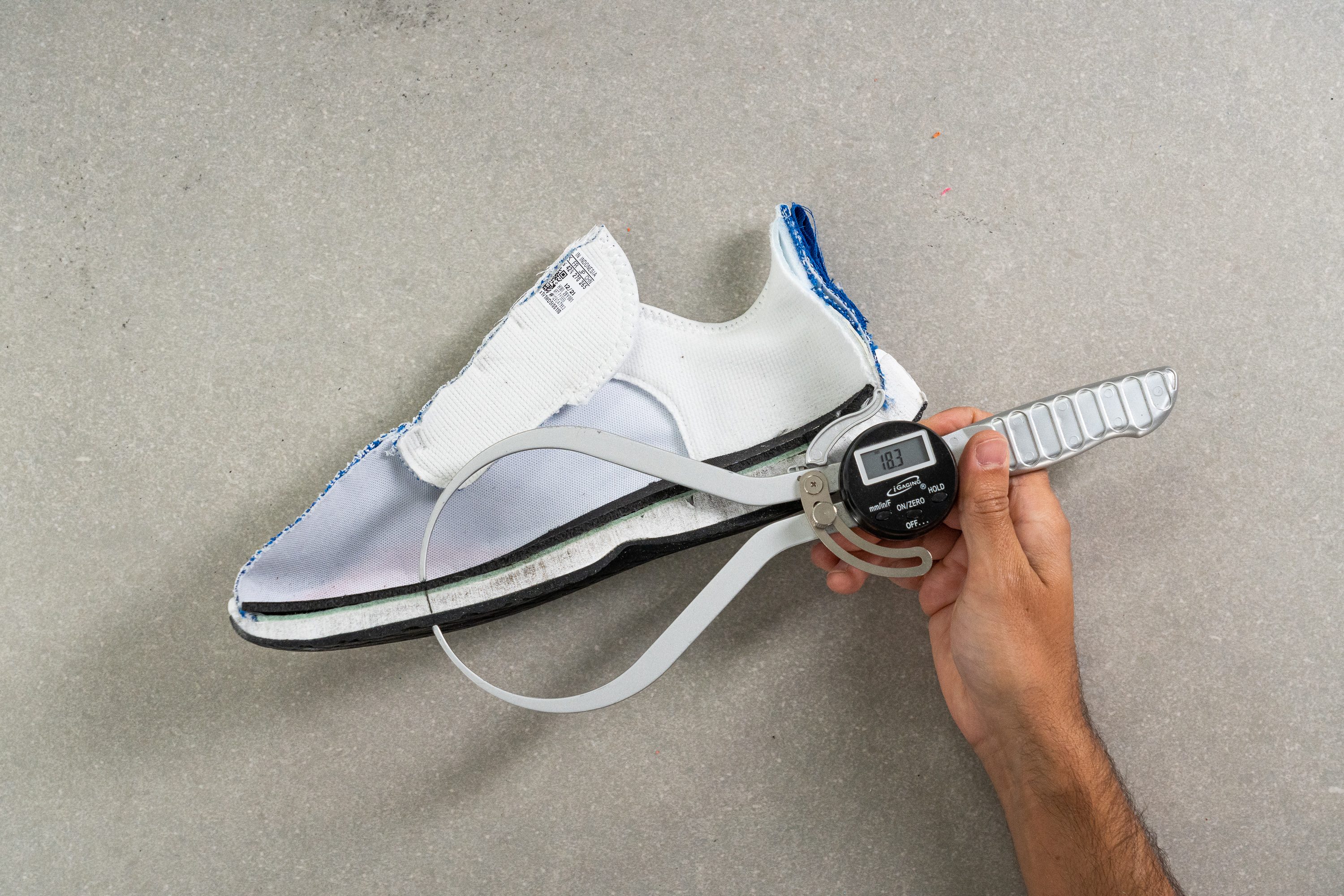
| Fluidflow 2.0 | 18.3 mm |
| Average | 26.2 mm |
Drop
These measurements leave us with a drop of 8.1 mm, just shy of the average for shoes we’ve tested in the lab so far. This classifies the Fluidflow 2.0 as a mid-high drop shoe and means that it can comfortably accommodate a variety of running styles.
Check out our guide that explains heel drop and how to choose the right drop height if you want to learn more.
| Fluidflow 2.0 | 8.1 mm |
| Average | 8.6 mm |
Midsole softness
We pressed our durometer against the Fluidflow 2.0’s midsole foam and got a reading of 25.4 HA. This level of softness offers a balanced level of cushioning underfoot that falls within the average range of shoes tested in the lab so far.
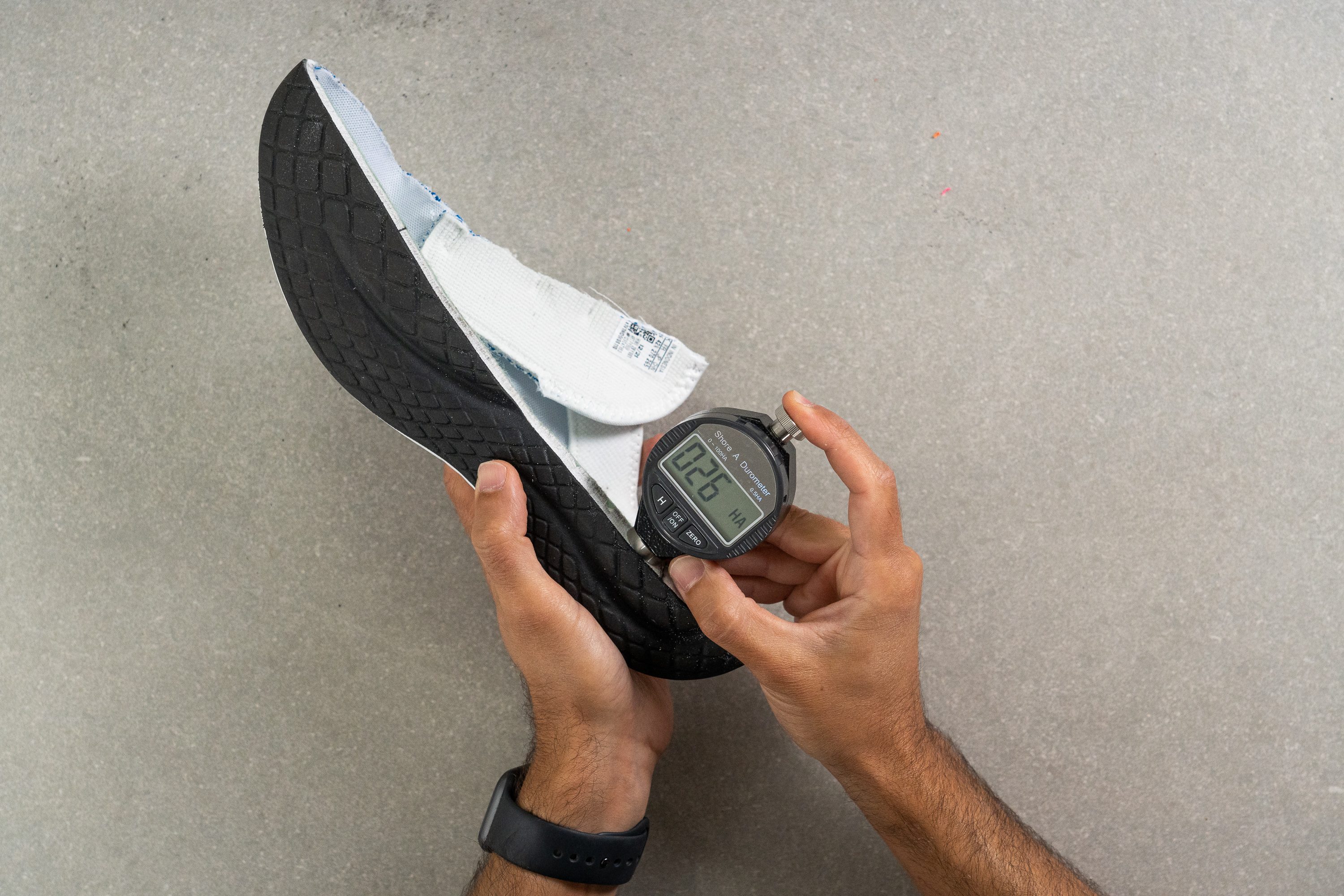
The “Bounce” technology of the shoe’s midsole not only provides good impact protection, but also gives us a level of bounciness that is normally reserved for more premium running shoes.
| Fluidflow 2.0 | 25.3 HA |
| Average | 20.4 HA |
Size and fit
Size
Adidas Fluidflow 2.0 fits slightly large (69 votes).
Internal length
| Fluidflow 2.0 | 270.2 mm |
| Average | 269.4 mm |
Width / Fit
Through our evaluation, we crafted a precise gel mold of the shoe's interiors and measured its widest point at 95.1 mm.
This balanced design comfortably accommodates runners with average-width feet while also supporting slightly narrow or moderately wide foot shapes with ease.
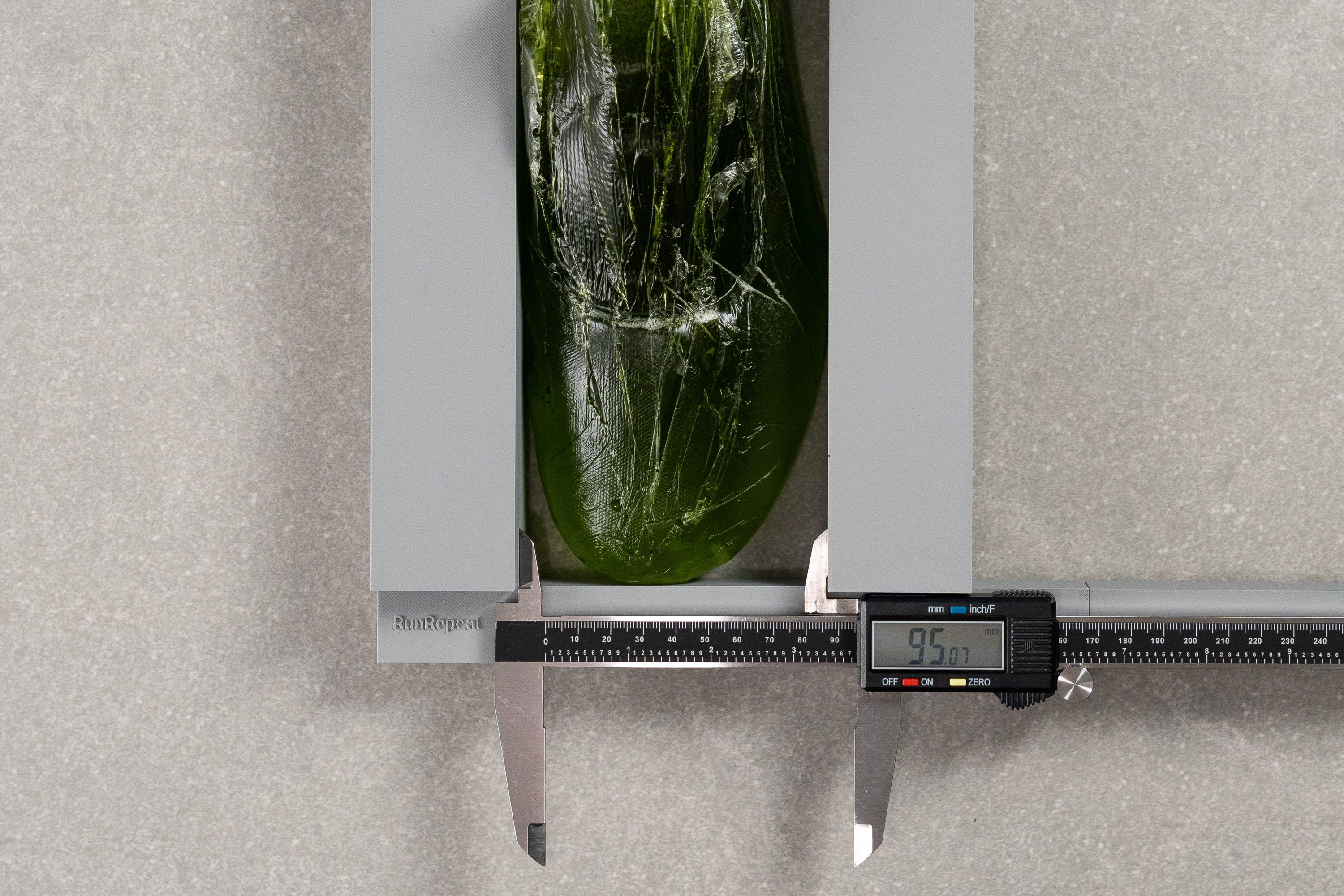
| Fluidflow 2.0 | 95.1 mm |
| Average | 95.1 mm |
Toebox width
We initially feared the Fluidflow 2.0 might feature a heavily tapered toebox, as some Adidas shoes often prioritize a streamlined shape over toe space. However, we discovered a balanced taper at 73.1 mm.
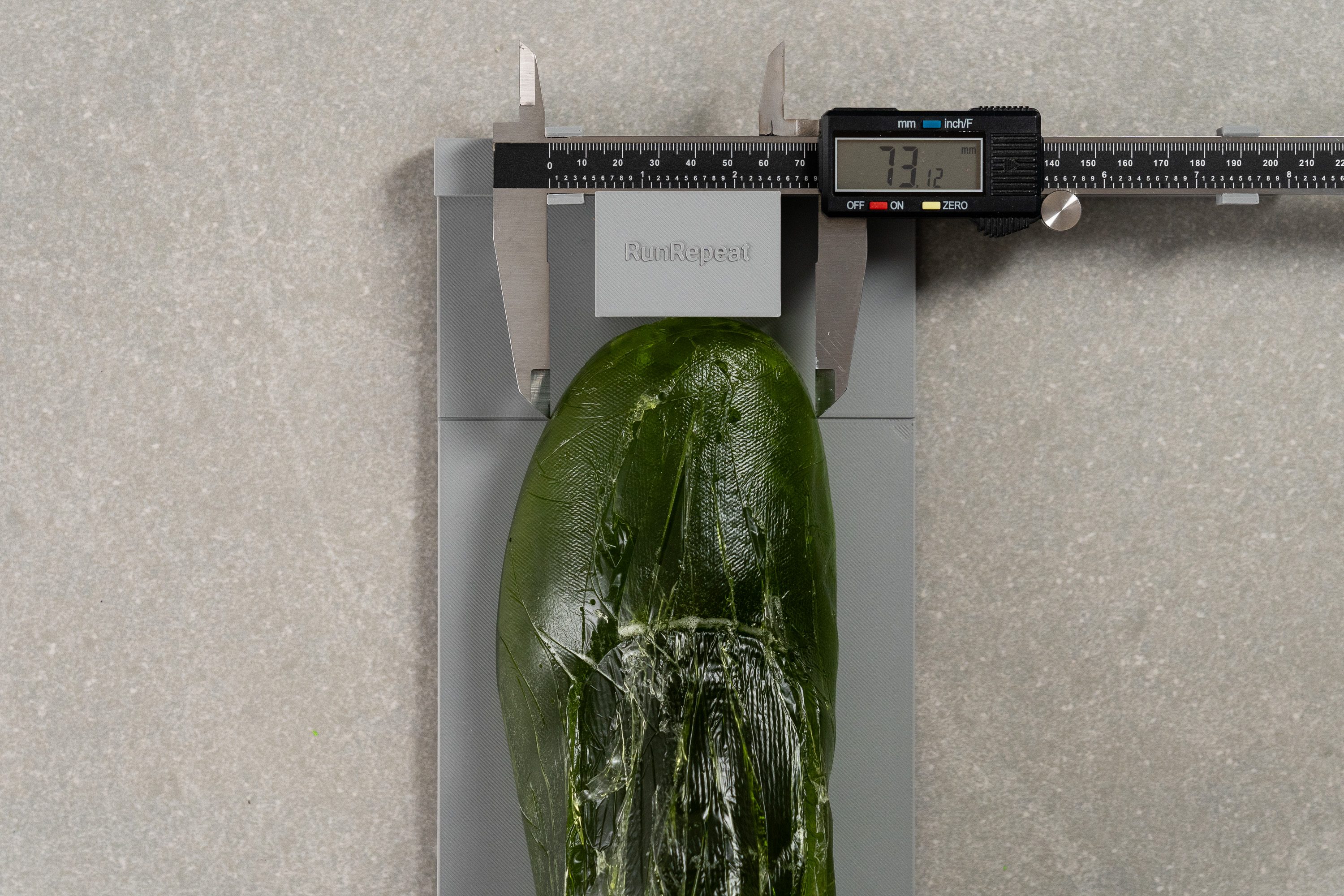
| Fluidflow 2.0 | 73.1 mm |
| Average | 73.3 mm |
Toebox height
The toebox volume is well-proportioned, providing ample space for upward toe movement without any restriction. Our final measurement revealed a height of 27.9 mm.
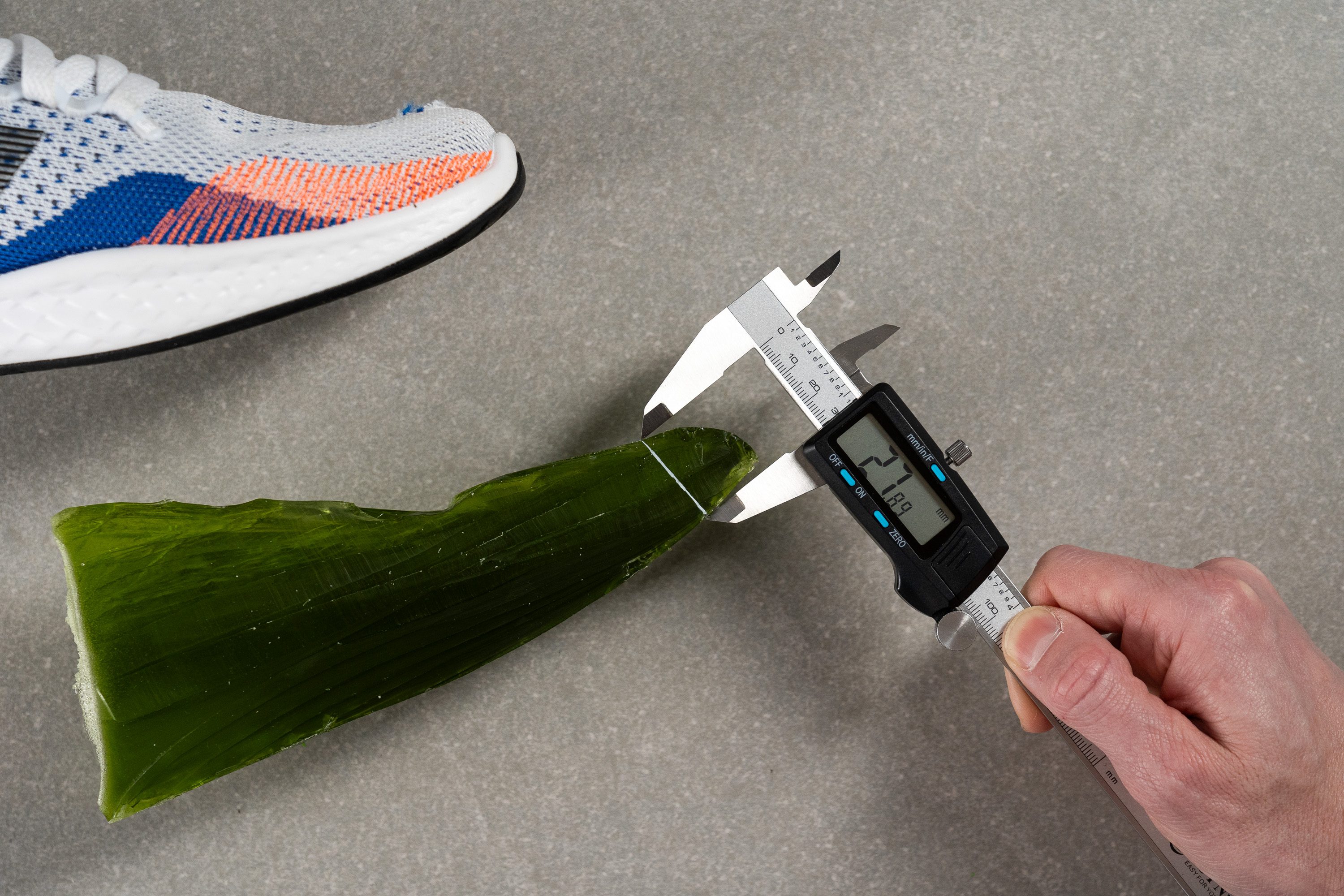
| Fluidflow 2.0 | 27.9 mm |
| Average | 27.0 mm |
Flexibility / Stiffness
We tested the flexibility of the Fluidflow 2.0 by measuring how much force it takes to bend the shoe 90-degrees. With a reading of 18.5N, the Fluidflow 2.0 is significantly less stiff than a vast majority of the shoes we’ve tested in the lab.
This level of flexibility means that the shoe moves with the foot during our stride rather than battering against it. This contributes to the shoe’s overall comfort, but does mean that we found the shoe a little too pliable to provide the responsiveness needed to facilitate longer or faster runs.
We recommend the Brooks Revel 6 as a speedier daily trainer, or the Saucony Axon 2 which is more supportive over long distances.
This test follows an older methodology, which is why you don't see recently tested shoes in the chart. Results from different methodologies can not be compared.
| Fluidflow 2.0 | 18.5N |
| Average | 28.1N |
Stiffness in cold (%)
After leaving the Fluidflow 2.0 in the freezer for twenty minutes, we repeated the flexibility test and found that only 27.6N of force is required to bend the shoe 90-degrees.
This level of flexibility is not only much more flexible than our current lab average under similar conditions, it also rivals the flexibility of over half the shoes we’ve tested at room temperature!
The difference in these two results means that the Fluidflow 2.0 stiffens up by 49.6% in the cold. This is about as much as we expect the average shoe to stiffen up in cold conditions but, as stated in the previous section, remains remarkably pliable.
| Fluidflow 2.0 | 50% |
| Average | 33% |
Weight
While the Fluidflow 2.0 looks lightweight upon first glance, with its low stack and knit upper, putting it on the scale shows that looks can be deceiving. At 11.1 Oz (316g), the shoe could use a diet to put it within the range of our lab average.
That said, the Fluidflow 2.0 never felt overly heavy when we took it out on test runs but for runners looking for a more lightweight shoe, we recommend the ASICS Gel Pulse 13.
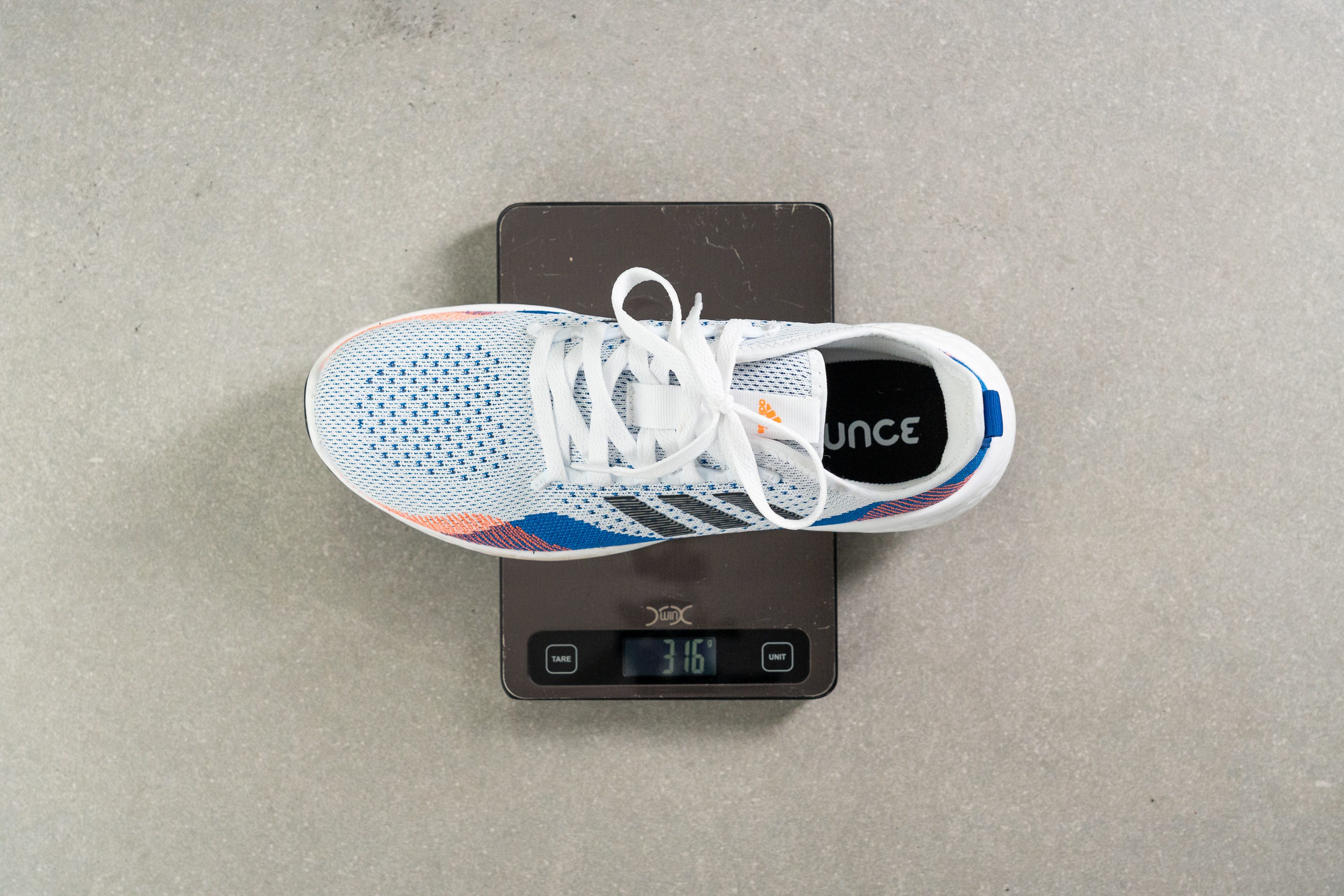
| Fluidflow 2.0 | 11.1 oz (316g) |
| Average | 9.3 oz (264g) |
Breathability
While the knit upper of the Fluidflow 2.0 seems well-ventilated, putting it through our smoke test reveals otherwise. We can see how the smoke struggles to escape the shoe, and when it does it mostly makes its way through the pores in the upper rather than the tongue. This implies that heat will eventually dissipate from the Fluidflow 2.0, making it a warm shoe that we score a 3 out of 5 for breathability.
Shining a light through a cross-section of the Fluidflow 2.0’s upper, we can see how dense the shoe’s knit material is by how little light shines through it.
This is further confirmed when we closely inspect the upper, which we can see is made of tightly woven braids with very few gaps for airflow.
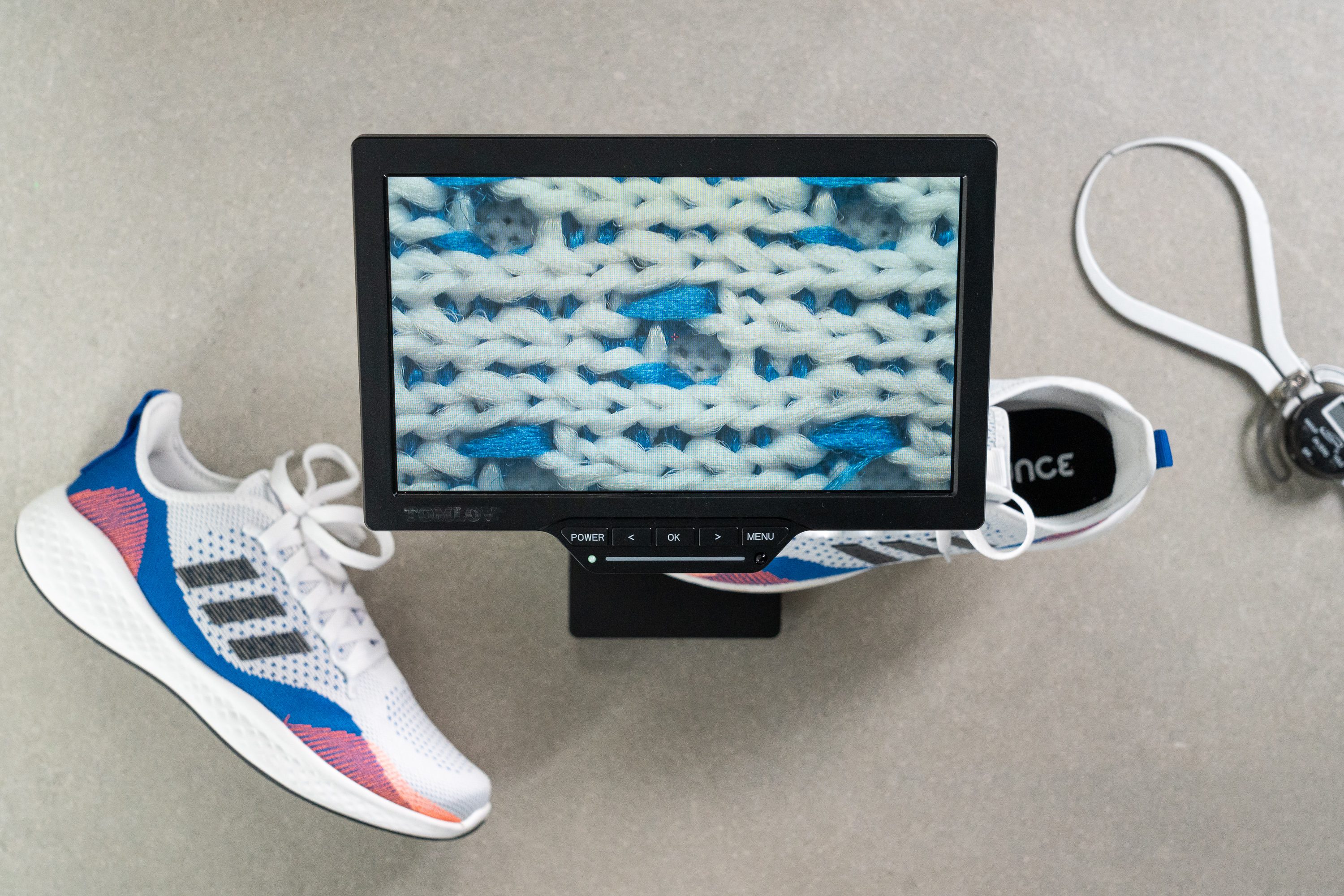
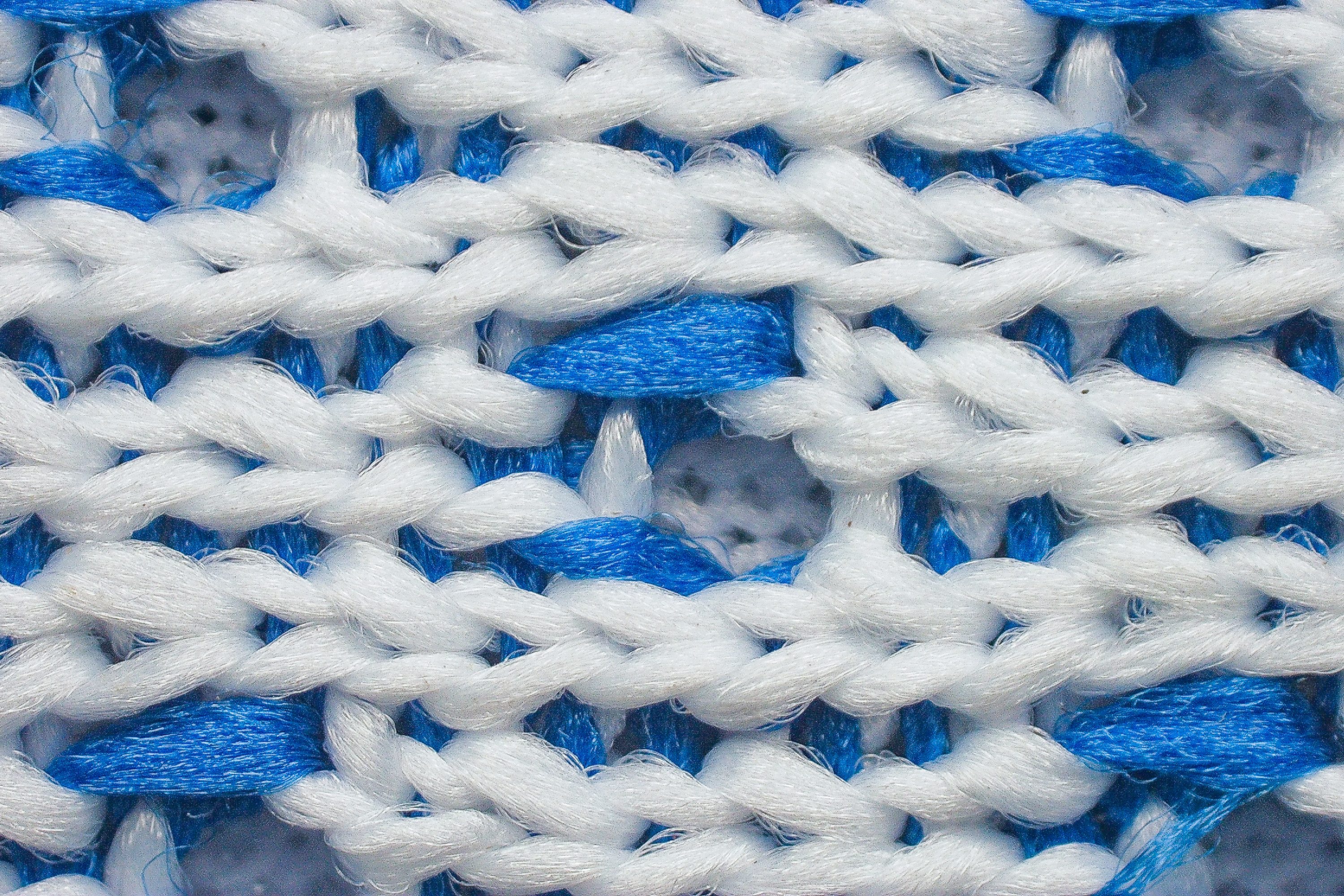
On the other hand, the shoe will feel snug and warm like a Christmas sweater when running during the colder months of the year.
| Fluidflow 2.0 | 3 |
| Average | 3.7 |
Stability
Lateral stability test
Shifting our weight from side to side in the Fluidflow 2.0 reveals a somewhat unsteady feeling underfoot. The loose heel counter doesn’t secure our foot in the shoe; with all that movement making ankle rolls seem inevitable, especially when cornering at high speed.
Torsional rigidity
Testing the shoe’s torsional rigidity, the Fluidflow 2.0 twisted and contorted with no resistance whatsoever, leading us to give it a score of 1 out of 5.
While this heavily factors into the shoe’s overall comfort; it doesn’t provide any added stability for pronating runners or those with flat feet, for whom we suggest looking into the Brooks Launch GTS 10.
| Fluidflow 2.0 | 1 |
| Average | 3.5 |
Heel counter stiffness
As briefly mentioned prior, the heel counter on the Fluidflow 2.0 is extremely flexible. As you can see, it offers no resistance to us pushing and manipulating it with our hand. This meant that even with a secure midfoot lockdown, we still felt our heels shifting around inside the shoe.
| Fluidflow 2.0 | 1 |
| Average | 2.9 |
Midsole width - forefoot
The Fluidflow 2.0 sports a narrower midsole than the average shoe, coming in at 109.3 mm according to our caliper.
This didn’t present us with any stability issues during our field tests, even when running with a forefoot-striking stride.
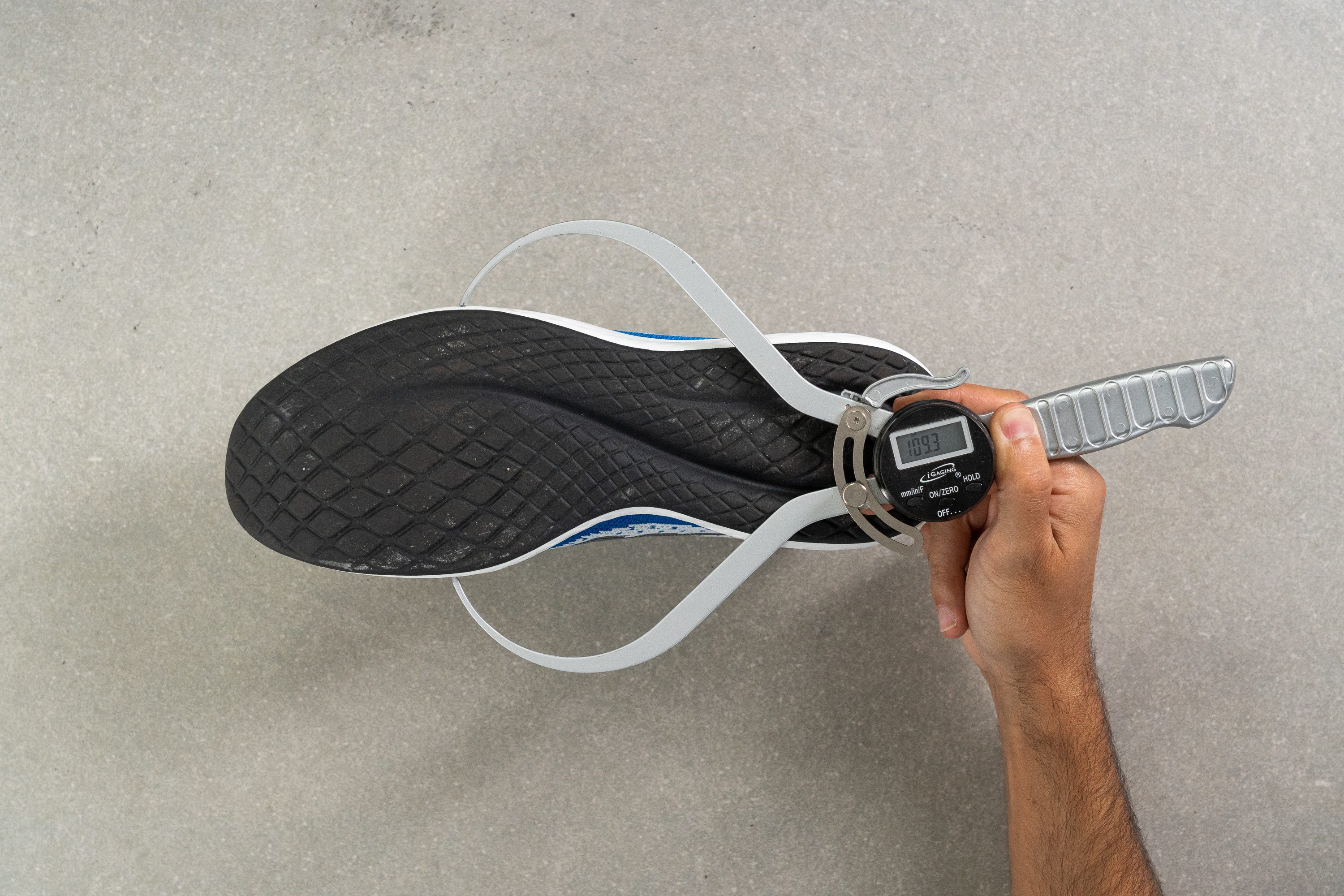
| Fluidflow 2.0 | 109.3 mm |
| Average | 114.4 mm |
Midsole width - heel
Measuring the midsole at the heel with our caliper, we found it to be 89.6 mm which is almost exactly as wide as our current lab average.
This gives heel-striking runners enough platform to ensure stable landings.
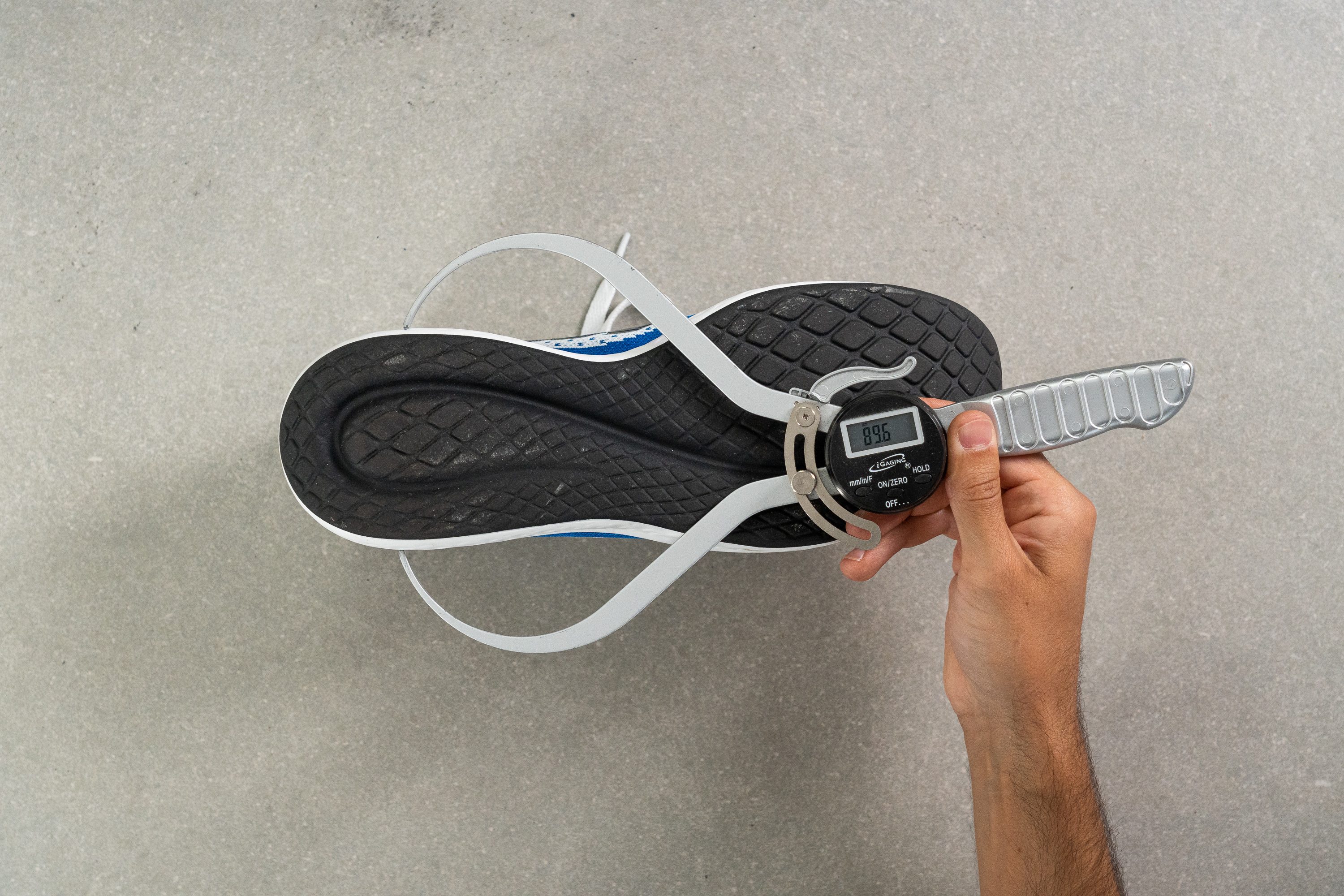
| Fluidflow 2.0 | 89.6 mm |
| Average | 90.6 mm |
Durability
Toebox durability
To test the durability of the Fluidflow 2.0, we got our dremel to 10K RPM and applied it to the shoe with a force of 3.2N for four seconds, starting with the toebox. While the footage from the test looks rather dramatic, with shreds of material being flung off the shoe, we were surprised to find that we hadn’t bored all the way through the upper once it was over. With a thin layer of fabric protecting remaining to shield our toes from the elements, we give the Fluidflow 2.0 a score of 3 out of 5 for toebox durability.
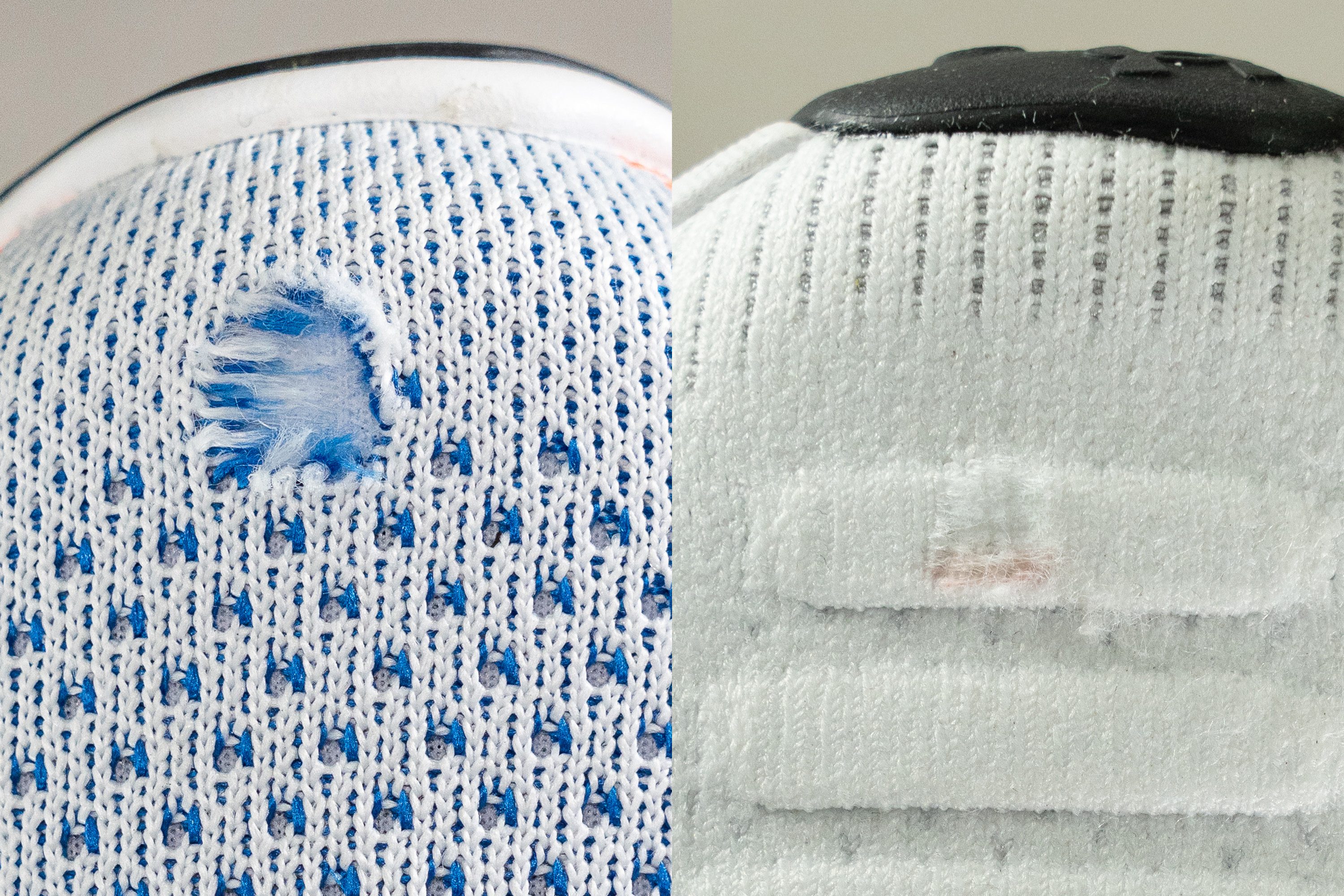
| Fluidflow 2.0 | 3 |
| Average | 2.6 |
Heel padding durability
The Fluidflow 2.0’s heel counter proved to be even more of a worthy adversary against our dremel. The tool’s grinding element was unable to bite into the collar’s sturdy material during the four second test, instead fruitlessly skating off it and leaving minimal visible damage afterwards.
Even with the damage, the heel counter still feels soft rather than rough or scratchy. As a result we scored the Fluidflow 2.0 a 4 out of 5 for heel padding durability; with very few shoes we’ve tested outperforming it so far.
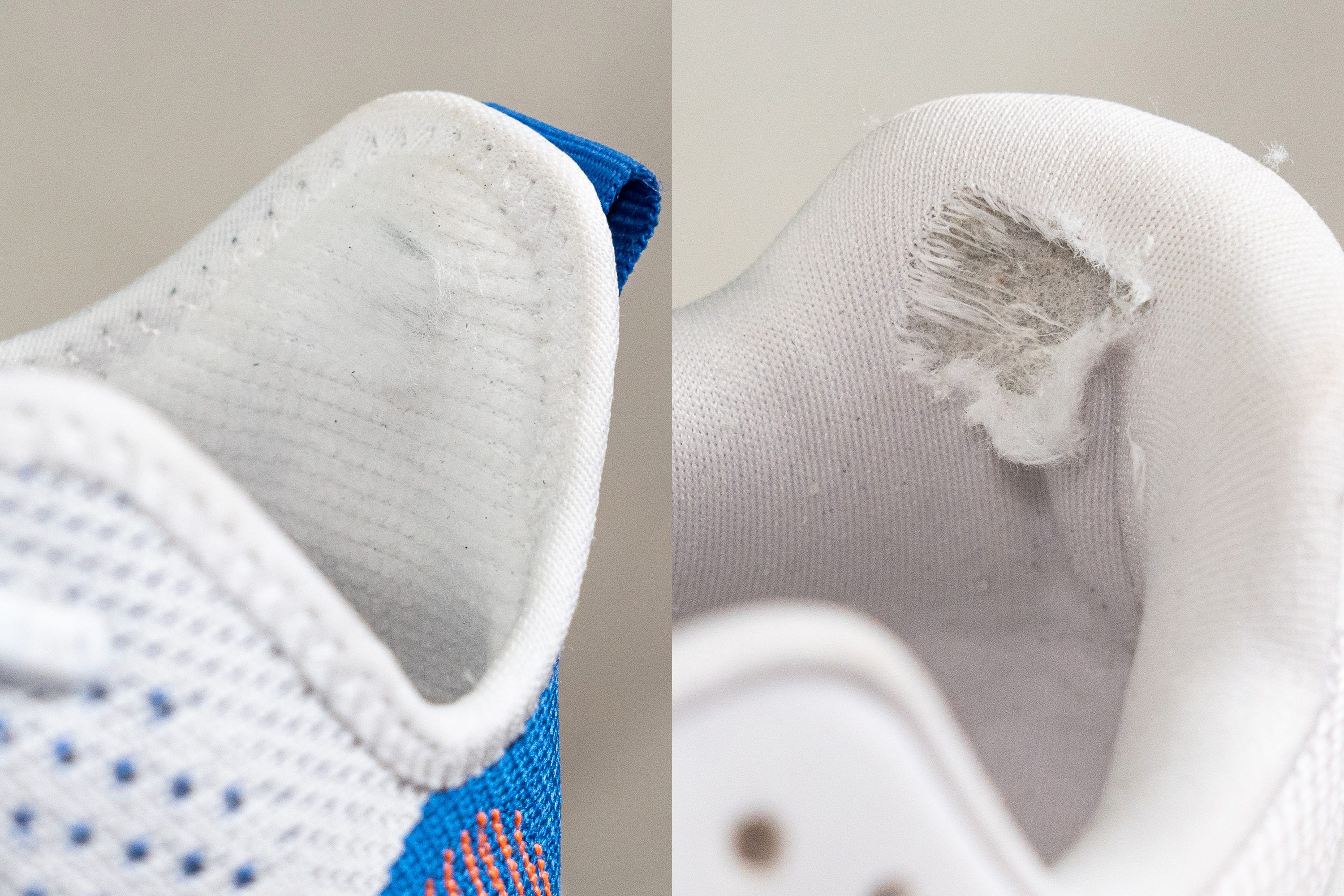
| Fluidflow 2.0 | 4 |
| Average | 3.4 |
Outsole hardness
To see how hard the material is on the outsole of the Fluidflow 2.0, we pressed our durometer against it and got a reading of 85.4 HC. This is a little higher than our current lab average, but still soft enough to allow the outsole to bite into and grip surfaces.
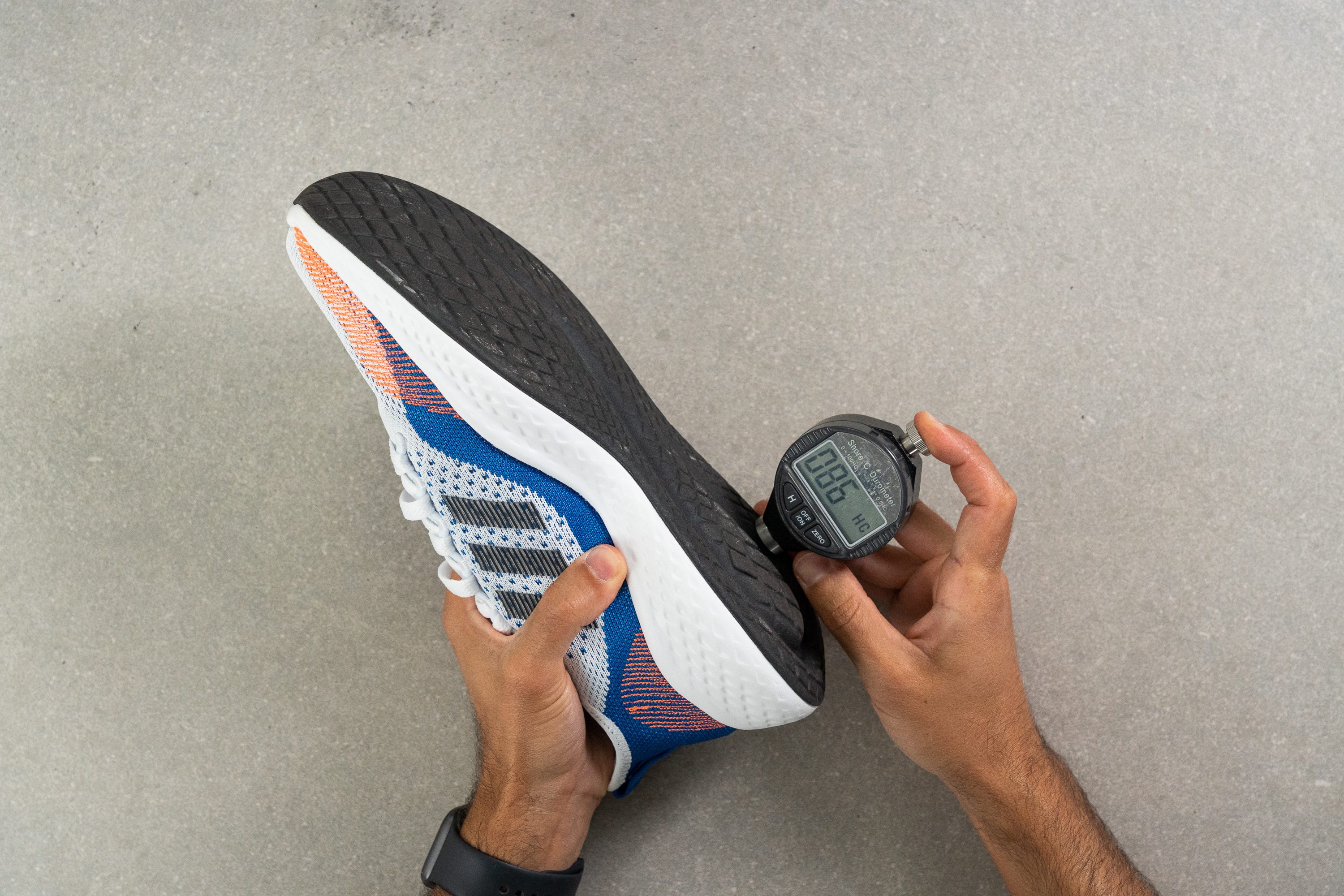
| Fluidflow 2.0 | 85.4 HC |
| Average | 79.2 HC |
Outsole durability
To simulate extreme wear-and-tear over time, we applied our dremel against the outsole rubber with the same amount of force as the tests above, but for twenty seconds instead. At the end of the test, we found that only 0.84 mm of rubber was worn away, barely enough to reach the grooves that define the snake-like outsole pattern.
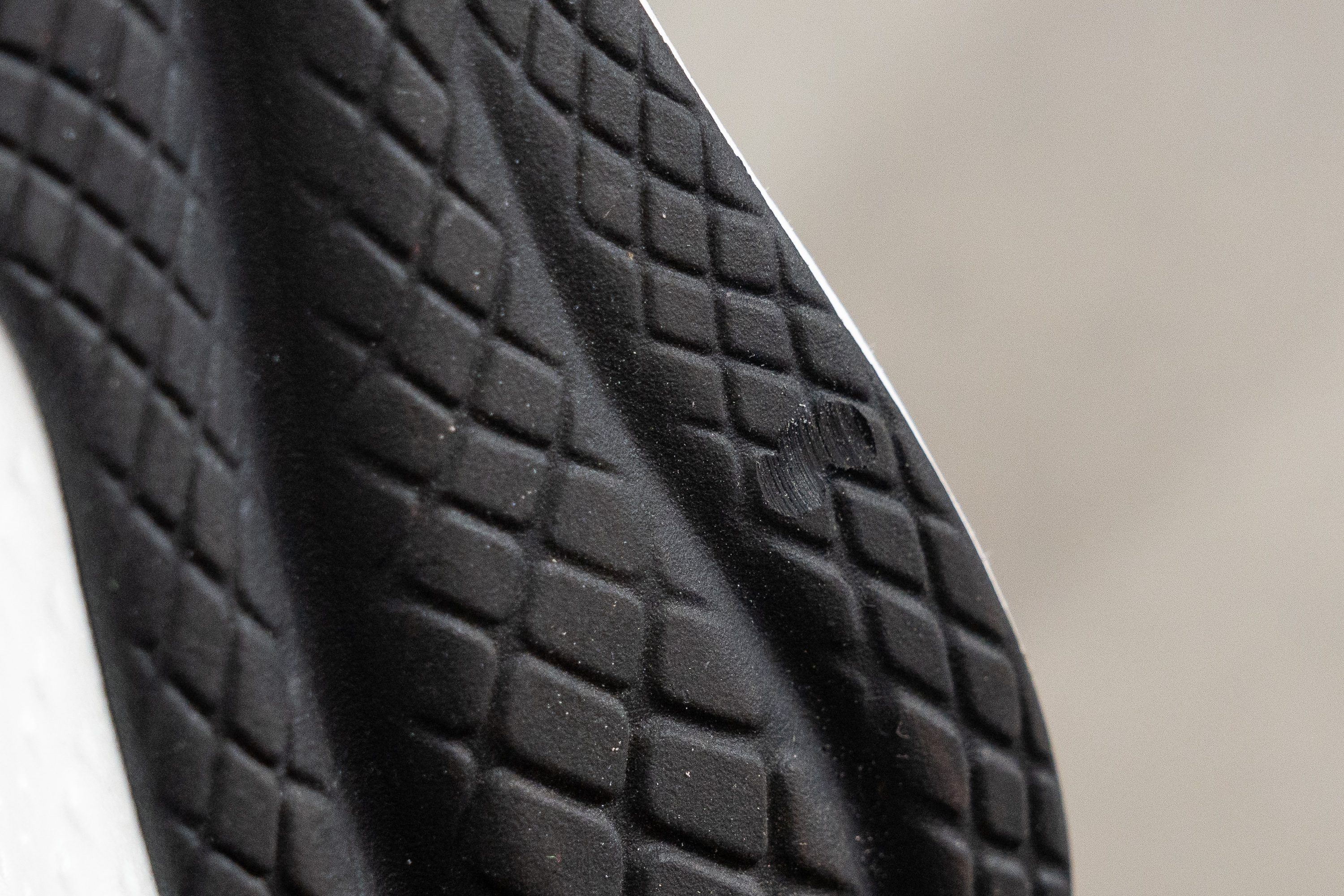
We therefore predict that it will be at least 500 miles before we notice any significant damage to the outsole of the Fluidflow 2.0
| Fluidflow 2.0 | 0.8 mm |
| Average | 1.1 mm |
Outsole thickness
Measuring 4.3 mm according to our caliper, the Fluidflow 2.0 boasts a mighty outsole compared to the average road shoe. This gives us a healthy amount of rubber to contend with before punching through to the midsole, which further supports our prediction regarding the shoe’s longevity.
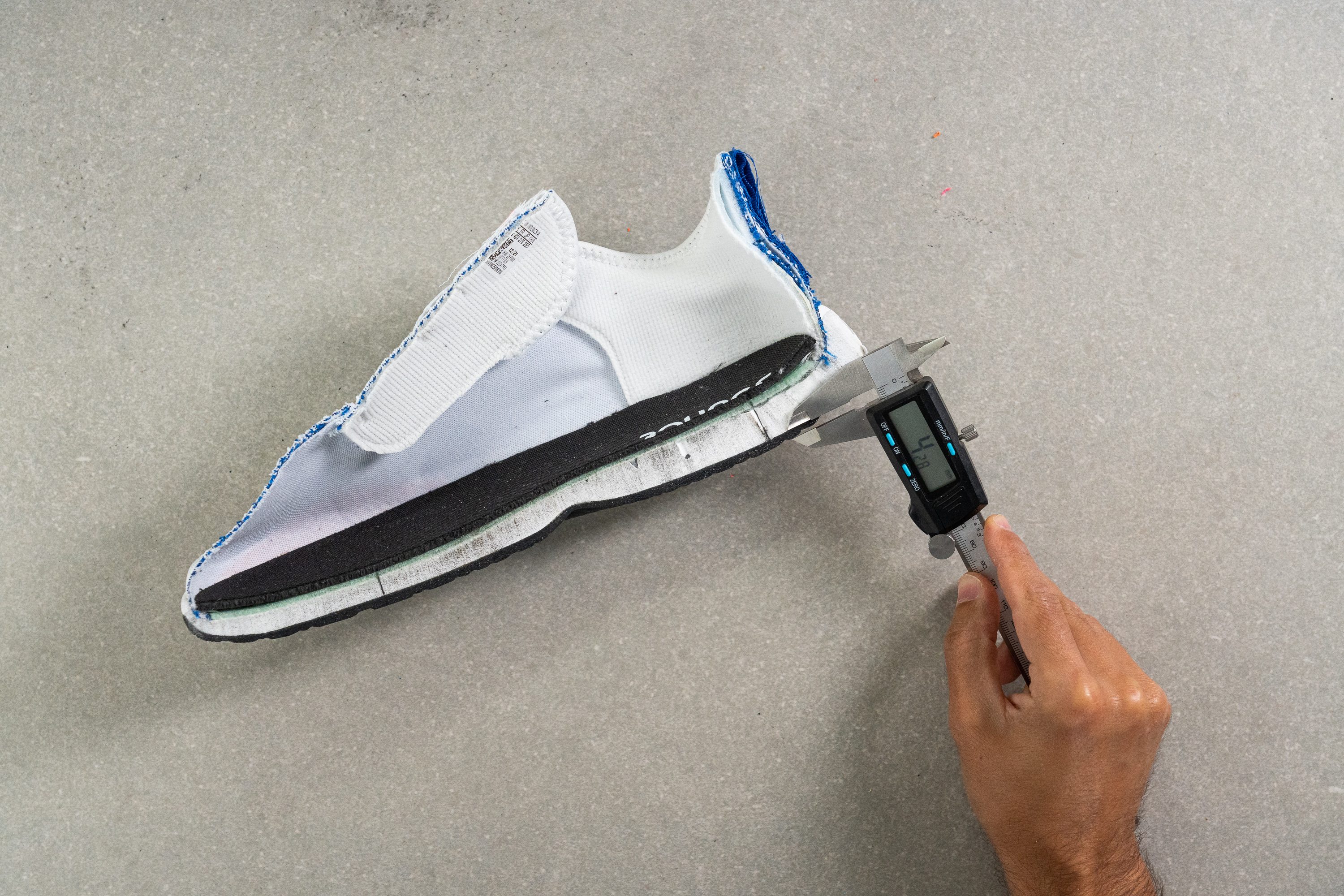
| Fluidflow 2.0 | 4.3 mm |
| Average | 3.2 mm |
Misc
Insole thickness
The Fluidflow 2.0 features an Ortholite sockliner that is 3.3 mm thick based on our caliper measurement. While this is thinner than average it still felt super cushy and comfortable, and its moisture wicking properties serve as an added bonus.
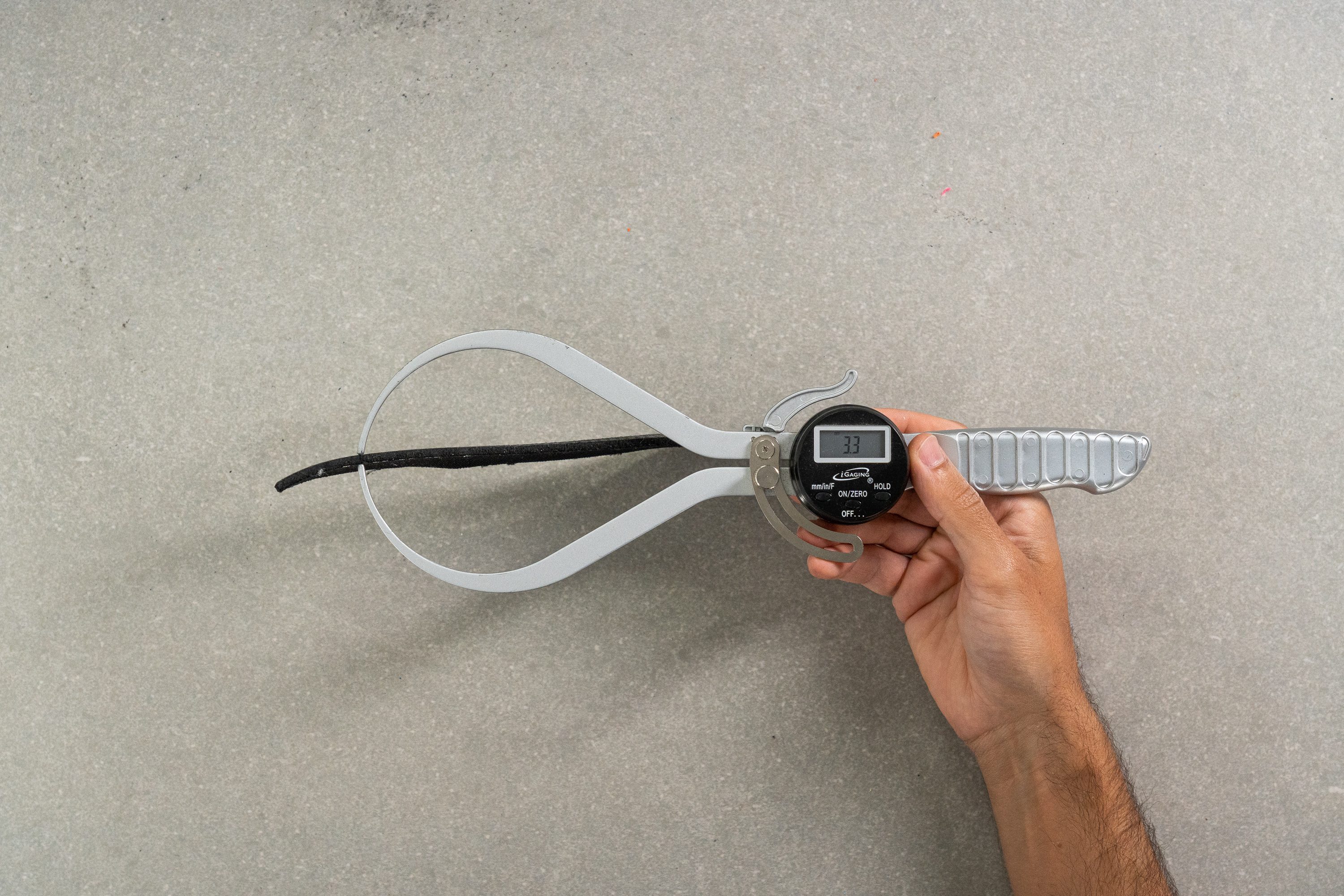
| Fluidflow 2.0 | 3.3 mm |
| Average | 4.5 mm |
Removable insole
The Ortholite insole in the Fluidflow 2.0 is removable and can be replaced with custom orthotics if necessary.
| Fluidflow 2.0 | Yes |
Midsole softness in cold (%)
To simulate exposure to cold conditions, we let the FLuidflow 2.0 chill in the freezer for twenty minutes. We then took another reading with our durometer and got a measurement of 30.9 HA, which is also right around the average level of softness for midsoles exposed to similar conditions.
While definitely firmer than at room temperature, the Fluidflow 2.0 still feels well cushioned and protective in the winter months.
The midsole of the Fluidflow 2.0 stiffens up by 21.6%, which is a little less than the average shoe does.
This makes the Fluidflow 2.0 on par with most running shoes when it comes to consistency between warm and cold weather.
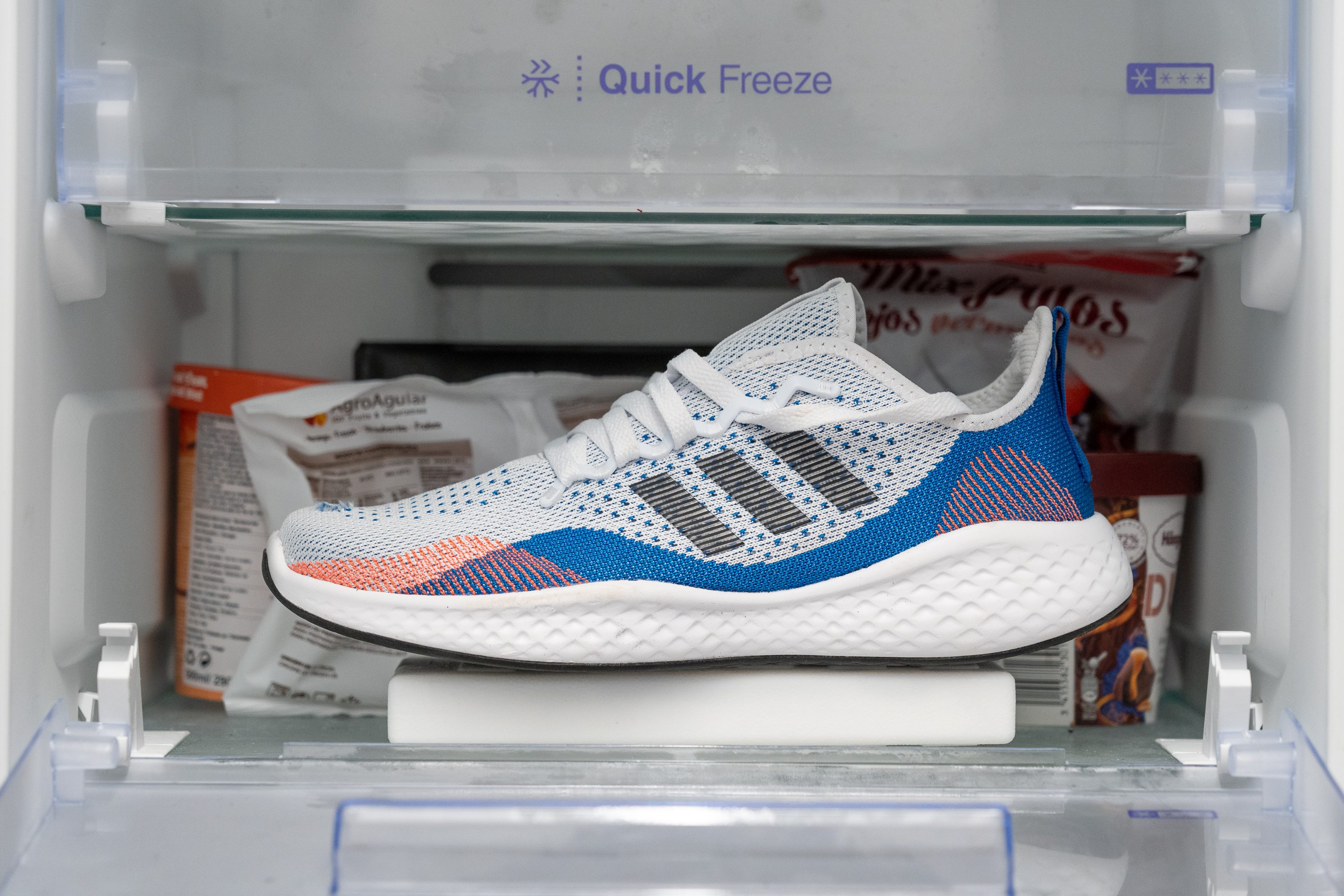
| Fluidflow 2.0 | 22% |
| Average | 24% |
Reflective elements
With no reflective elements whatsoever, we recommend sticking to well-lit routes when running in the Fluidflow 2.0 out at night.
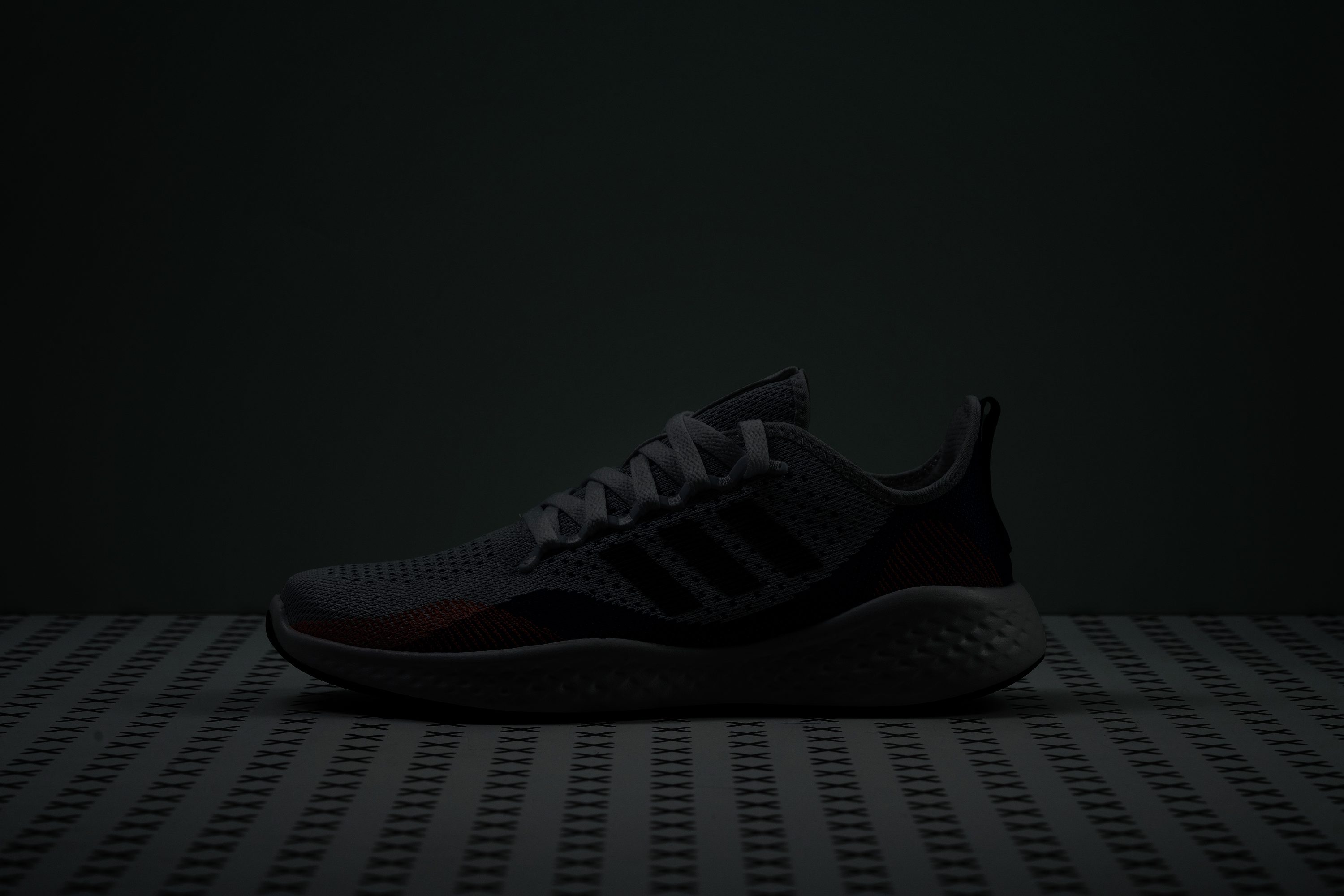
| Fluidflow 2.0 | No |
Tongue padding
Measuring 4.9 mm, the Fluidflow 2.0’s tongue is less padded than the average shoe. We still felt comfortable around the instep, and were able to tie the shoe down as snugly as we needed without the dreaded pinch of lace-bite.
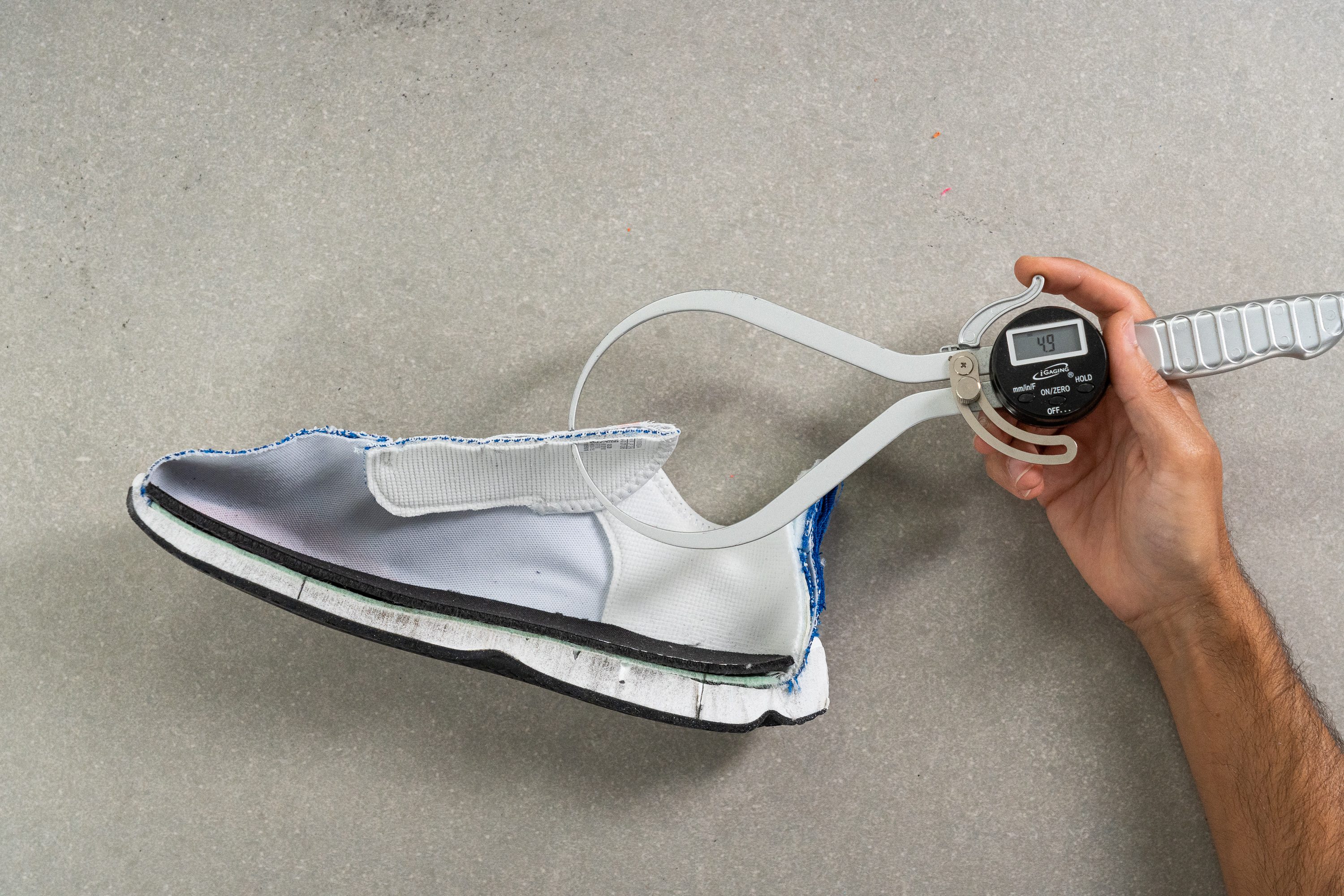
| Fluidflow 2.0 | 4.9 mm |
| Average | 5.7 mm |
Tongue: gusset type
The tongue on the Fluidflow 2.0 is non-gusseted, however its wide coverage across the instep meant that we didn’t experience any slippage on our test runs.
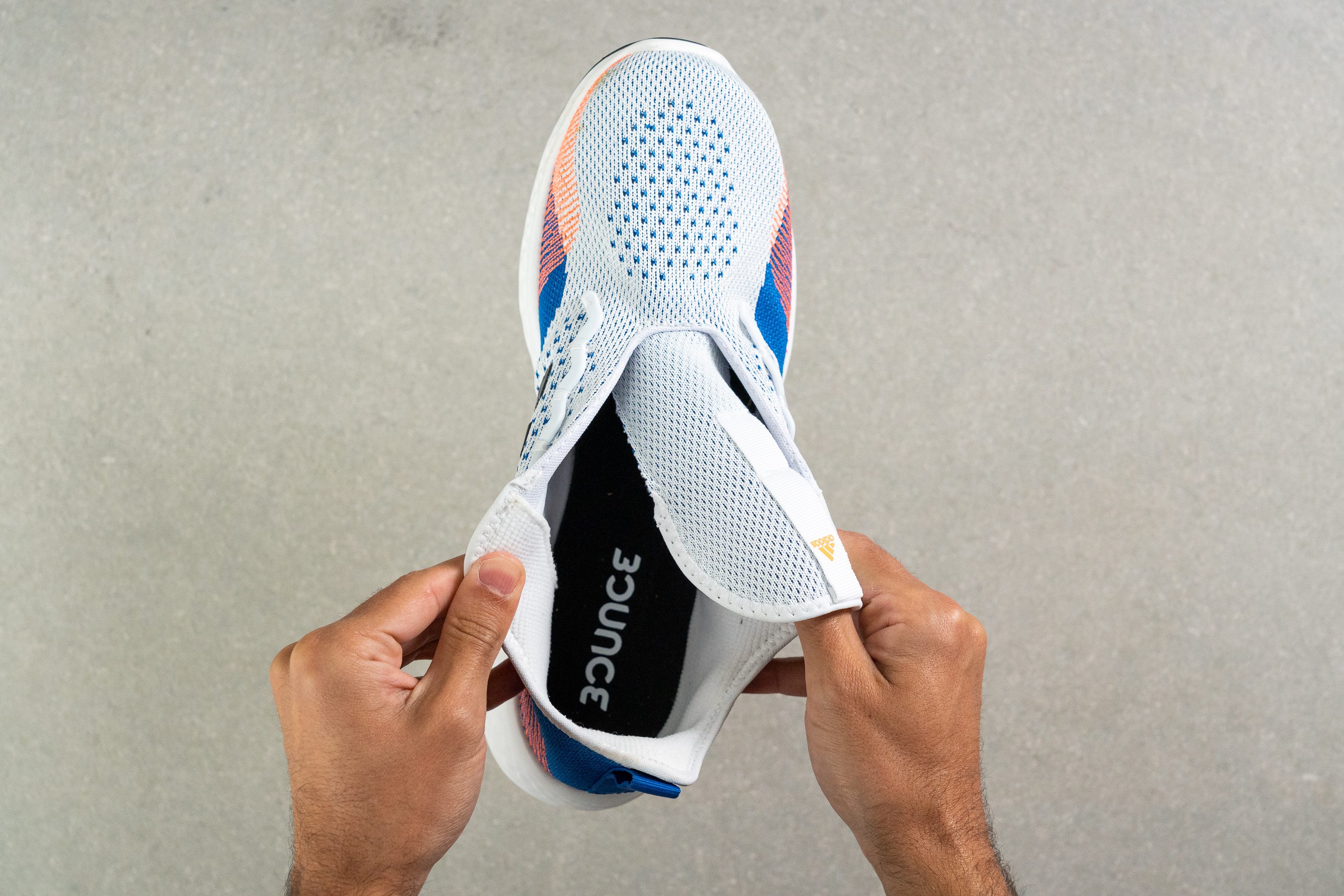
| Fluidflow 2.0 | None |
Heel tab
The Fluidflow 2.0 has a finger loop at the heel which helps to prevent the soft heel counter from flopping over as we put our foot into the shoe.
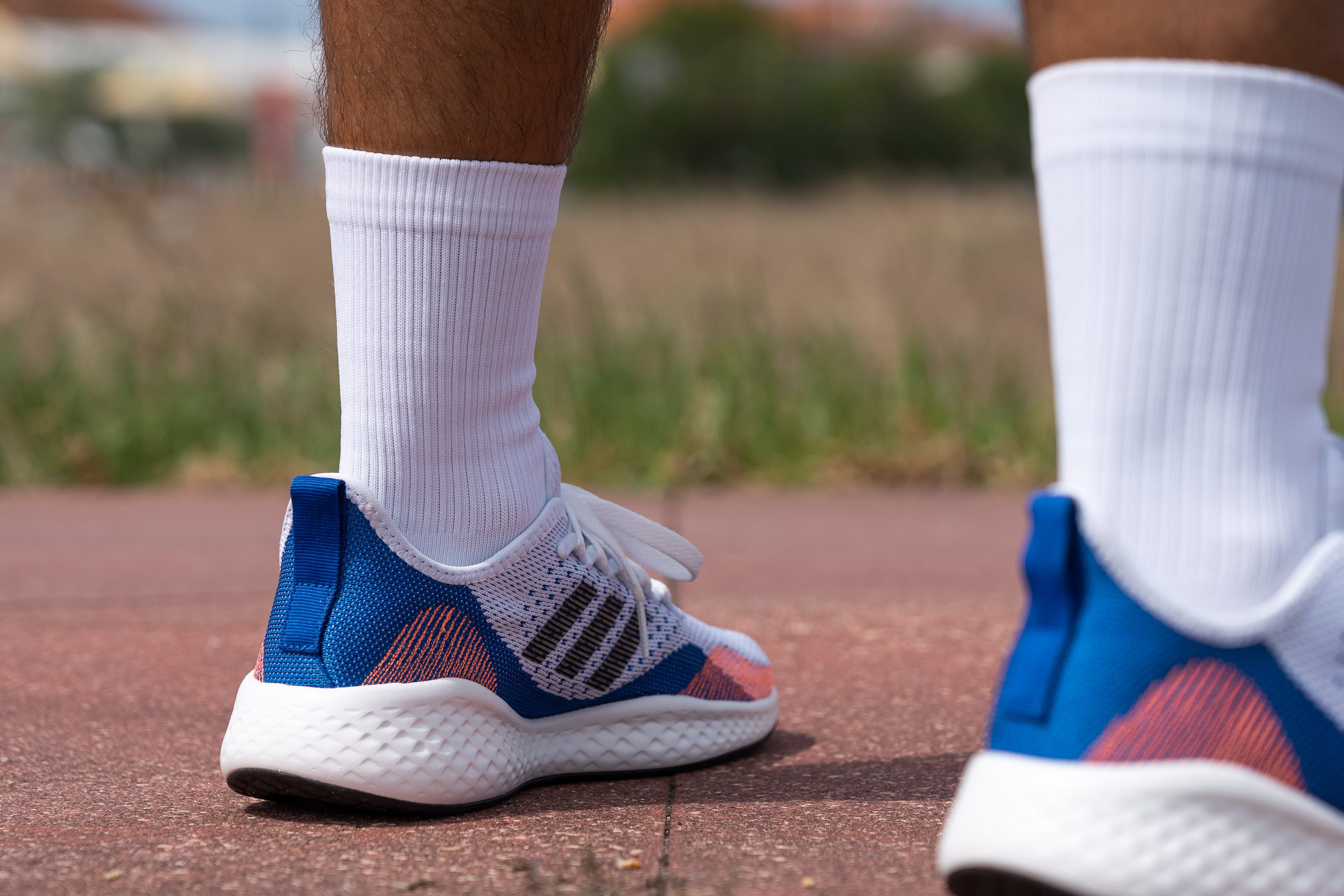
| Fluidflow 2.0 | Finger loop |

